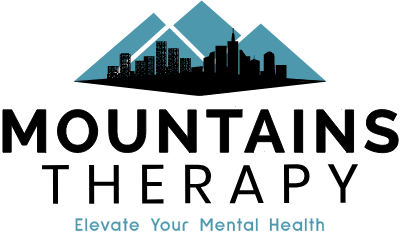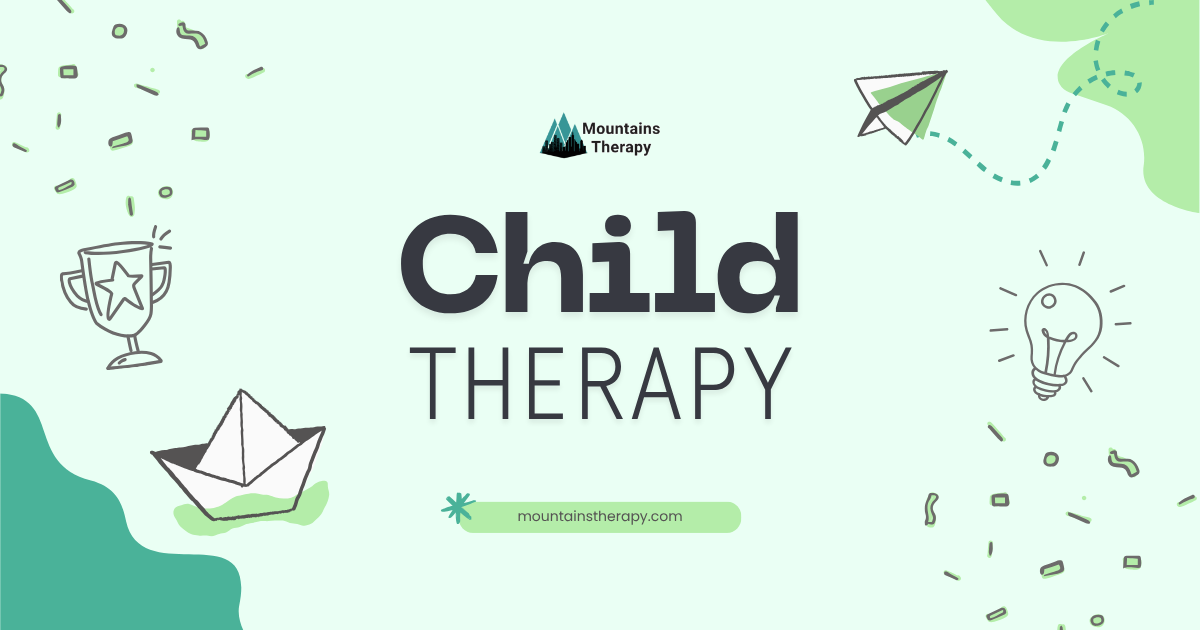Child Therapy in Montclair, NJ at Mountains Therapy
Learn more about Individual Child Therapy.
In This Blog, You’ll Learn:
✅ What child therapists do and how they help
✅ What types of child therapists exist
✅ Whether child therapists can diagnose ADHD, call CPS, or testify in court
✅ How to explain therapy to a child
✅ Signs your child may benefit from therapy
✅ How in-person therapy supports emotional growth
What Is Child Therapy?
Child therapy is a safe and supportive space where children and adolescents can explore their feelings, manage behavior, and develop tools for emotional growth. A child therapist is a licensed professional trained in working with the unique developmental needs of children, using approaches like play, creative expression, and talk therapy.
Whether your child is struggling with anxiety, trauma, behavioral challenges, or ADHD symptoms, therapy can provide them with a positive foundation for growth, confidence, and emotional safety. Learn more about child ADHD therapy.
Signs a Child Might Benefit From Therapy
- Big emotional reactions or frequent meltdowns
- Difficulty concentrating or possible symptoms of ADHD
- Changes in sleep or appetite
- Withdrawal or isolation from friends or family
- Sudden academic decline
- Trauma, grief, or parental separation
Myths vs. Facts About Child Therapy
Myth: Kids are too young to understand therapy.
✅ Fact: Children are incredibly receptive to emotional tools when therapy is made age-appropriate and creative.
Myth: Therapy is only for severe problems.
✅ Fact: Many children come to therapy for everyday stressors and challenges like sibling conflict, social anxiety, or big transitions.
Myth: A therapist will keep parents out of the process.
✅
Fact: Parent involvement is often crucial, and therapists will include you appropriately while honoring your child’s privacy.
Common Parent Questions About Child Therapists
What is a child therapist?
A mental health professional who specializes in working with children using developmentally appropriate therapeutic tools.
What are child therapists called?
Child psychologist, child behavioral therapist, child life therapist, inner child therapist (in adult therapy), child occupational therapist (for physical or developmental concerns).
Can a child therapist diagnose ADHD?
Yes, many therapists can screen for ADHD and refer for further testing if needed.
Can a child therapist disclose information to parents?
Yes, with care. Therapists may share treatment goals or safety concerns while keeping therapy a safe space for your child to open up.
How to explain what a therapist is to a child?
“Someone who helps you talk about your feelings, play, and figure out ways to feel better.”
How to become a child therapist?
A Master’s degree in a mental health field (such as Social Work, Psychology, or Counseling), licensure, and supervised clinical hours are required.
What is an inner child therapist?
In adult therapy, this refers to a therapist who helps you process and heal early childhood experiences.
What does a child occupational therapist do?
They support children with physical, motor, and developmental delays to gain independence in daily tasks.
What is a child life therapist?
Usually based in hospitals, they help children cope with illness, medical procedures, and hospitalization.
What is a child behavioral therapist?
Someone who focuses on modifying disruptive behaviors, often using rewards, structure, and skill-building techniques.
Coping Tools We Teach Children in Therapy
- Naming and understanding feelings
- Using grounding techniques and breathwork
- Problem-solving and building self-confidence
- Managing behavior with self-awareness and regulation tools
- Strengthening family communication and connection
Now Offering In-Person Child Therapy in Montclair, NJ
We are thrilled to now offer in-person child therapy at our Mountains Therapy office in Montclair, NJ. Our therapists support children ages 6 and up with a wide range of needs, from behavior issues and anxiety to trauma recovery and family transitions.
Therapy sessions may involve drawing, games, storytelling, movement, mindfulness, or talking—depending on your child’s age and comfort level. We also provide Family Therapy when appropriate to support everyone in the home. We continue to offer In Person andOnline Therapy for teens ages 15+ in New Jersey, North Carolina, Florida, and Utah.
How Therapy Helps With Childhood Challenges
We use a variety of evidence-based methods including:
- CBT – Cognitive Behavioral Therapy: Helps children recognize and change unhelpful thoughts and behaviors.
- DBT – Dialectical Behavioral Therapy: Teaches emotion regulation and coping strategies.
- TF-CBT – Trauma-Focused CBT: Designed to help children and teens process traumatic experiences.
- Family Therapy: Helps improve connection and communication within the family system.
Play and expressive arts techniques tailored for younger children.Therapy creates a supportive environment for emotional healing, positive behavior change, and growth.
How Therapy Helps Children Thrive
At Mountains Therapy, we use a variety of evidence-based therapeutic approaches to meet each child where they are emotionally, behaviorally, and developmentally. These methods are tailored to your child’s age, needs, and goals to support lasting growth and healing.
Here are some of the core approaches we use in child therapy:
- CBT – Cognitive Behavioral Therapy:
Helps children recognize and shift unhelpful thinking patterns, develop problem-solving skills, and build emotional resilience. Especially helpful for anxiety, depression, and behavior concerns. - DBT – Dialectical Behavioral Therapy:
Teaches essential skills like emotional regulation, distress tolerance, and interpersonal effectiveness. Adapted versions are used with children and tweens to help manage mood swings, impulsivity, and intense emotions. - TF-CBT – Trauma-Focused Cognitive Behavioral Therapy:
Designed to support children and adolescents in safely processing traumatic experiences, this method incorporates gradual exposure, relaxation techniques, and caregiver involvement. - Family Therapy:
Strengthens family communication, improves emotional connection, and resolves patterns of conflict. Parents or caregivers are guided in learning tools that reinforce therapeutic progress at home. - Play Therapy:
What are play therapy ages? Especially helpful for younger children, play therapy is most commonly used with ages 3 to 12.Using toys, games, puppets, and imaginative scenarios, therapists help children express thoughts and emotions that may be difficult to verbalize. It builds trust, emotional vocabulary, and self-regulation in a developmentally appropriate way. - Art Therapy and Expressive Arts Techniques:
Creative expression through drawing, painting, sand tray, or sculpture gives children an alternative outlet for processing emotions. Art therapy helps children who may be withdrawn, overwhelmed, or unsure how to talk about their feelings. It fosters self-awareness, emotional expression, and insight—all while giving them control over their healing process.
Child therapy creates a supportive and structured space for emotional healing, behavior regulation, confidence building, and social development. Whether your child is struggling with transitions, trauma, attention issues, or big emotions, our integrative approach is designed to help them feel safe, seen, and supported.
Supporting Back-to-School Transitions Through Therapy
The start of a new school year can bring a mix of emotions for children—excitement, anxiety, overwhelm, or even dread. Whether your child is entering a new grade, changing schools, or simply adjusting to a different routine, these transitions can be emotionally taxing.
At Mountains Therapy, we support children through back-to-school stressors such as:
- Separation anxiety or difficulty saying goodbye at drop-off
- Social worries, peer pressure, or friendship changes
- Academic stress and perfectionism
- Behavioral regressions or emotional outbursts after school
- Suporting 504 accommodation Plans
Therapy provides children with emotional tools to navigate these changes with greater confidence and resilience. By identifying what’s underneath the behavior, whether it’s fear, pressure, or sensory overload, we help your child feel more prepared, understood, and supported during the school year. This is also a great time for families to build consistent routines, open communication, and supportive habits that will carry into the months ahead. Therapy can help the entire family reset and reconnect as the new academic year begins.
Ready to Schedule In-Person Therapy for Your Child?
We are now accepting new child therapy clients for in-person sessions in Montclair, NJ. We’re here for you—and your child—every step of the way. Use the link below to check availability and request an appointment online.














